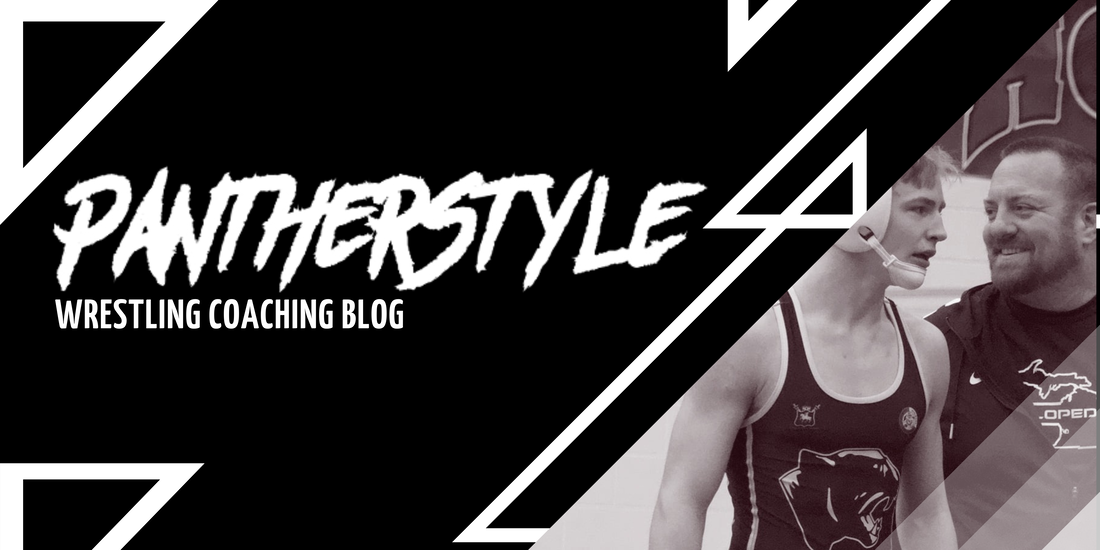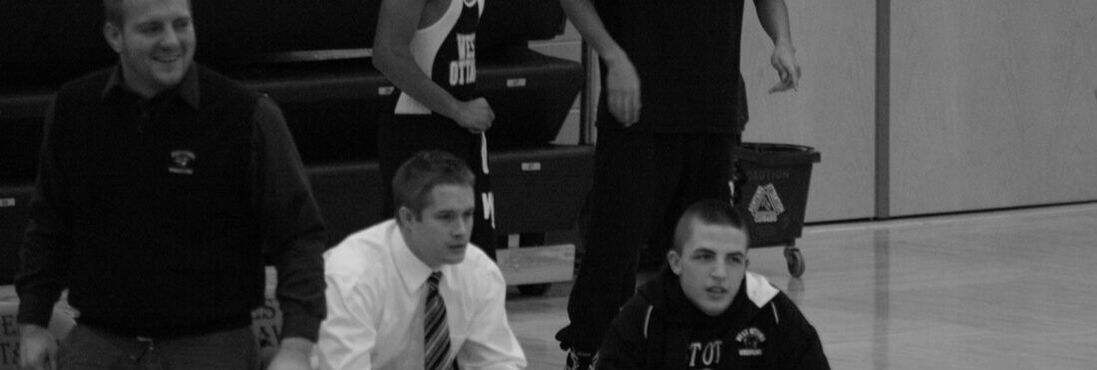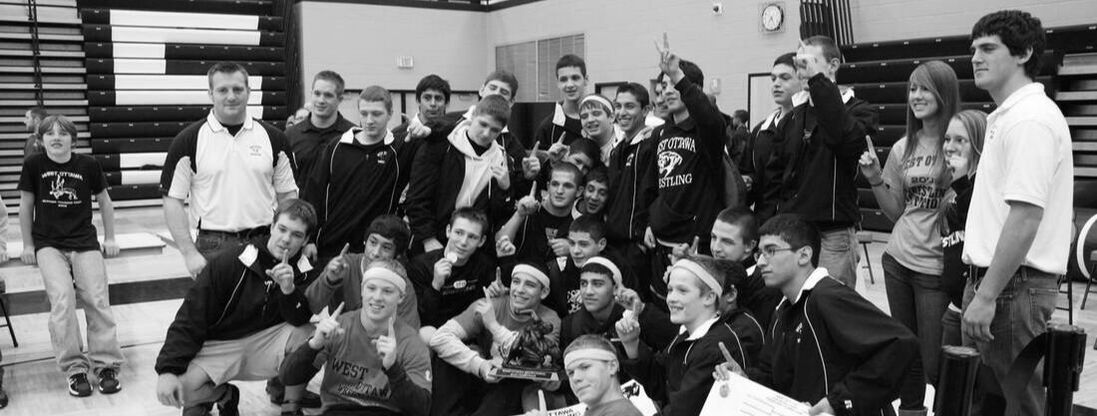|
(Disclaimer: This is not professional or legal advice. If it were, the article would be followed with an invoice. Do not expect to win any social media arguments by hyperlinking my articles. Chances are, we are both wrong). Let me level with you: these here are some notes and musings from my time coaching at West Ottawa High School. But before we go any further, let me make one thing crystal clear: I'm no longer affiliated with the program and ain't currently coaching there. Nope. Nada. Zilch. Now, why am I sharing these pearls of wisdom with you, you ask? Well, my dear reader, it's because I want to help the wider wrestling community and see other programs flourish. These notes are a way for me to impart my hard-earned knowledge and experience, and hopefully make a difference. But, let me be clear, these thoughts are mine and mine alone. They don't necessarily represent the views of West Ottawa High School or its brass. So take 'em or leave 'em, it's up to you. Just know that they come from a place of passion and a desire to see the sport thrive. PANTHERSTYLE CULTURE “Define your culture or your culture will be defined for you. The most disappointing seasons generally are the ones where everyone assumes they will be better because most of the starters come back.” -Pat Santoro “Culture eats strategy for lunch.” -Carl Eschenbach Regarding sports, it's not just about physical prowess and technique. The way a team thinks and feels can make or break its success. That's what we call culture - the values, attitudes, and beliefs that shape a team's identity. If you want your team to thrive, you need some key ingredients: effective leadership and clear communication. That means getting everyone on the same page, setting expectations, and giving folks a chance to step up and lead. But that's not all. You've got to create opportunities for team-building, establish shared responsibilities, and even develop some team rituals (don't sacrifice any goats, okay?). And hey, remember regular feedback sessions - they're crucial for keeping everyone on track. If you want to win, it's not just about hitting the gym. It's about building a culture that supports your goals. Put it all together, and you've got a recipe for success. The notion of culture as a mere symbol or catchphrase insults its true essence. It's not something you can slap on like a bumper sticker or a t-shirt slogan; it's a way of life, a constant embodiment of values and behaviors. Crafting a genuine culture demands patience, persistence, and unwavering principles. It's a gradual process that requires steadfastness and an uncompromising vision. In the pursuit of cultivating culture, the role of assistant coaches is crucial, as they are the torchbearers of your message in your absence. To illustrate, the clever use of social media platforms can serve as a potent tool in fostering and nurturing your team's culture. Culture isn't just some checklist you mark off. It's a hard-fought battle every day. The character and style of the head coach bleed into the team's coaching philosophy. We show our true colors in how we treat our athletes and what we hold dear as a coaching staff. Consistency is vital from the language we use to the discipline we enforce. And let's remember the parents! They're in the stands, at games, and driving home with their kids. Are they speaking the same language as us? Are they in line with what we stand for as a program? These are the questions we must ask ourselves to build a winning culture. The ultimate goal? To get those kids out there saying, "I wrestle." If they can identify with the sport, especially at a young age, chances are they'll be grappling on the mats through high school. And let me tell you, we want four teams, including Junior Varsity, Varsity B, Girls, and Varsity. To achieve that kind of domination you must start back in kindergarten. You must nurture that culture from the ground up. And here's the thing - that culture will shift as your student population changes. So you better keep that in mind as you build. But let me tell you, when you get it right and create that strong culture, positive results will follow. Commitment, discipline, leadership, and camaraderie - are the essential components of a winning team culture. When you bring good athletes into that winning culture, magical things will happen. It's a beautiful thing. Teams are like a river, always moving and constantly changing. The athletes come and go, but the program remains like a rock, steady and robust. Forget rebuilding seasons; let's focus on the positive and talk about winning. When coaches are asked what it takes to build a successful program, they discuss big ideas like vision, culture, leadership, buy-in, and support. But they never utter the word 'win.' Funny, isn't it? Program Culture: Leadership “20% of your time is building culture” - Mike Powell And that's where the coaches come in. These men and women mold the wrestlers into champions, both on and off the mat. It's not just about winning matches – it's about adding value to their athletes' lives, day in and day out. To truly excel, a wrestling program needs leaders who can build a culture of high expectations and unwavering trust. These coaches know that their relationships with their athletes go far beyond the scorecard – they're there to guide, mentor, to inspire. They're the ones who push their wrestlers to be their best selves, both on and off the mat. So if you want to create a winning wrestling program, remember that it's not just about your moves. It's about the culture you start, the relationships you build, and the impact you have on those around you. Leaders embrace pain and suffering. We must ask ourselves what is the difference between our reputation and character? Systemic Leadership is LOVE. Everything in life starts with a vision. If your vision is solely fixated on winning wrestling matches, you're in for a rude awakening. That kind of limited vision won't sustain or succeed. I ain't just living for the thrill of victory on the mat, that's not enough to fulfill me. Hell no, I need something more than just a medal around my neck to make me feel alive. TEAM BUILDING Giving the wrestlers a say in how the team operates is crucial. Letting them speak up and molding the team's character and vibe would be best. Being a righteous leader means being all ears and open to their ideas and crafting an atmosphere where everyone's thoughts and feelings matter. This builds a sense of unity and dedication, making every member down for the cause of the team's triumph. Facilitate Team Building Team building. It's not just important; it's the pièce de résistance of the sporting season. Every year, without fail, I ask my wrestlers to recall their favorite moments from the season, and it's never about a match. No, no, no. It's always about those precious moments of team building - those overnighters where they can let loose and be kids. And how do we achieve these magical moments of camaraderie? It's all about planning activities that unite the team. Think outside the box, folks. We're talking team dinners, movie nights, and clinics. But why stop there? How about paintball, bowling, swimming, or a good old-fashioned camping trip? The possibilities are endless. And let's remember team camps. A chance for the team to bond, sweat, and learn together. It's not just about building a better team; it's about making better people. What is the bare minimum for any team? Team dinners. Sure, making the kids eat together is a no-brainer, but it's about more than just filling up their tanks for competitions. It's a shared experience that builds camaraderie, and you need that if you want your squad to fight hard, not just for themselves but for the team. After all, when you're close-knit and prepared, you're unstoppable. Lead your Program: The key is to build a culture of excellence, discipline, and good old-fashioned elbow grease. You can't just sit back and hope for the best. You have to set expectations for your team and goals that are achievable and give them the resources and support they need to succeed. But leading a wrestling program isn't just about being the boss. It's about being a role model for your athletes. You have to walk the walk and talk the talk. Embody the values and principles you want your team to follow. Show them what it means to be a true champion, on and off the mat. Build More Leaders: As a wrestling coach, you must be more than just a guy who teaches your athletes how to hit takedowns and pins. One of your main gigs is to mold those young bucks into leaders, plain and simple. You want those wrestlers of yours to step up and take ownership of their development, both on and off the mat. Now, how do you do that? It is not rocket science. You have to provide your athletes with the tools they need to lead. That means giving them leadership training, throwing them captaincy roles, and encouraging them to mentor the younger wrestlers. When you create a leadership culture, you're setting your wrestlers up for success, not just in the ring but in all aspects of their lives. They'll be more confident, resilient, and practical, whether going for the championship belt or crushing it in the real world. Mentoring: Mentoring wrestlers is like holding the keys to the kingdom of their potential. It's like being the GPS that guides them through the labyrinth of challenges and setbacks. As a mentor, you have the power to steer your wrestlers in the right direction and help them hone their skills. But it's not just about technique and strategy; it's about fostering a sense of camaraderie and instilling the values that go beyond the mat. You can be the beacon of light that illuminates their path to success, both on and off the mat. Investing time and energy in your wrestlers' growth creates a culture anchored in trust, respect, and shared purpose. So, embrace your role as a mentor and unleash the full potential of your wrestlers. Impacting the Community: Wrestling programs have the power to shake things up to make a real difference in the lives of the people they serve. When you actively engage with the community, you can spread the good word about your program and show others what it means to live a life of excellence, discipline, and grit. It's not just about putting on a show or winning matches. No, it's about making a mark on the world and inspiring others to do the same. You can do this by throwing community events, participating in local fundraisers, and partnering with other organizations to promote health and fitness. By positively impacting your school and community, you can leave a legacy that will last for years. So get out there, show the world what you're made of, and leave your mark on the wrestling world. The possibilities are endless, my friends. Leaving a legacy: Are you leaving a legacy? It's about more than just being a wrestling coach. It's about creating something that lasts beyond your time on this earth. Something that inspires future generations of wrestlers to follow in your footsteps. And how do you do that? By building a program that values excellence, discipline, and hard work. By instilling a culture of leadership and actively engaging with the broader community. And by mentoring your athletes, one-on-one or in small groups, to help them develop their skills, mental toughness, and goals. To truly leave a lasting legacy, you must pass on your knowledge and experience to the next generation of wrestlers. That's where the Senior Legacy Book comes in. It's a collection of materials created by graduating senior wrestlers to pass down to their successors. Inside, you'll find everything from the program's history and traditions to the seniors' reflections. It's a way to preserve the program's legacy and inspire future wrestlers to carry on the torch. Community Service: Imagine this: a wrestling team that doesn't just aim to pin down their opponents on the mat but also strives to pin down societal issues in their community. How, you ask? By organizing a community service project that tackles a local need and makes a positive impact. The options for such a project are endless - from spearheading a food drive for the less fortunate, volunteering at a homeless shelter, or restoring a nearby park or beach. The key is to match the wrestling team's interests and skills with the community's needs. But it's not just about doing good for others. A community service project can also do wonders for the team itself. It brings them closer together as they work towards a shared objective beyond the wrestling mat. It helps them develop crucial skills like leadership, teamwork, and communication. And it instills a sense of pride and accomplishment as they witness the positive impact they are making in their backyard. Organizing a successful community service project requires planning and communication. The team must research the community's needs and contact relevant organizations or charities to work together. Setting clear goals and communicating with everyone ensures a successful event. Daily Activity for Character, Culture, and Values: To build up those sterling character traits and values that'll serve you both on and off the mat, you must engage in all sorts of activities. Think team meetings, goal-setting sessions, and team-building exercises - all aimed at molding you into the kind of person who knows how to win with grace and lose with dignity. And let's not forget about the coaches, those hard-asses who are always whining about discipline, respect, and perseverance. They'll be on your case day in and day out, pushing you to be your very best - both in practice and competition. To keep your mind and body in tip-top shape, you'll also be encouraged to do meditation, mindfulness, and exercise because a healthy wrestler is a happy wrestler, after all. Team Creed: The team creed is the wrestling program's beating heart. It's a declaration that lays out the program's fundamental beliefs and values, a roadmap that charts the course for success. Within its lines, you'll find the team's mission, code of ethics, and lofty goals it strives to achieve. It's a sacred text, a touchstone that wrestlers and coaches alike turn to in times of need. In the creed, we find our purpose and principles, the essence of being a part of this magnificent team. To create a team creed, coaches and team members have worked together to identify the core values and principles that guide the team's identity and performance. Think of traits like hard work, determination, resilience, sportsmanship, teamwork, and respect. And once that creed is set, it has to be recited by every team member after every practice and competition. This ritual reinforces the team's identity and reminds everyone of their commitment to each other. The creed can also be a powerful motivator, especially in tough times. Reciting it together creates a sense of collective responsibility and accountability, reminding everyone of the importance of the team's values. Spotlight: It's that time when wrestlers get to bask in the glow of their achievements in front of the whole team. And why not? It's a chance to brag a little, tout their own horn, and show off a little bit. But it's not all about wrestling, oh no. The spotlight is also a time to highlight their academic pursuits or their involvement in the community. It's a time to celebrate the multidimensionality of these athletes to showcase their versatility and capacity for greatness, both on and off the mat. So, let the light shine down and let these wrestlers bask in their glory. They deserve it. Put-Ups: Picture a group of sweat-soaked wrestlers, each taking their turn to give props to their teammates for a job well done. It's a moment of camaraderie, brotherhood, and pure unadulterated machismo. You see, success is hard-won and even harder to come by in the world of wrestling. So when a wrestler manages to pin their opponent to the mat or execute a flawless takedown, it's cause for celebration. And that's where the put-up comes in. It's a chance for each wrestler to acknowledge their teammate's achievements, offer encouragement and support, and bask in the glory of their collective successes. It's a moment of unity in a sport about individual strength and skill. 2-2-1: It's a daily reflection exercise for wrestlers. They have to think about two things they're thankful for, two things they've overcome, and one thing they're nervous about. This helps them stay positive and acknowledge the tough stuff they face. Hero-Highlight-Heartache: Wrestlers pick one hero they look up to, one highlight from their recent life, and one heartache they're currently dealing with. It's all about reflecting on experiences and emotions and building self-awareness and empathy. TRADITIONS Do you want to know the secret to winning consistently? It's all about developing a killer culture. I'm talking about the culture that makes everyone on the team feel like they're a part of something special. You can't just throw a few quick fixes at the problem and hope for the best; that isn't going to cut it. No, my friend, you have to be willing to put in the work. You must believe in the process and trust that the results will come. And that all starts with getting your athletes into a successful lifestyle. They need to know what it takes to be a winner and believe in themselves enough to go all in. If you want to build a culture of champions, you must do it correctly. And that means laying the foundation with a shared vision of success and a commitment to living up to it daily. So please don't look for any shortcuts because they don't exist. The Pantherstyle Wrestler’s Creed As a wrestler on the Pantherstyle team, I promise to face every challenge with determination and courage. I will behave with honor and respect, and I will proudly represent my family, school, community, and team. My teammates are like my brothers and sisters, and I will support them no matter what. I will not be afraid when things get tough because I know I have the passion, strength, and power to succeed. My victories are not just physical but mental and emotional too. I will never forget the values that make our team great. I will come to every match ready to do my best and earn as many points as possible. Together, we are the Pantherstyle wrestlers. We will work hard to be the best and create a legacy of excellence that will last years. Post-Season The postseason is when wrestlers showcase their individuality on the mat by donning whatever uniform they desire, whether home or away attire. It's a time when conformity takes a backseat to self-expression, often lacking during the regular season, where team camaraderie is emphasized through dual wrestling. But make no mistake, our team fully embraces our black color, as black-clad athletes are synonymous with death, a perfect embodiment for executing the dreams of our opponents. Every year I make very special singlets that only the state qualifiers get to wear. To add an extra punch of intimidation, we carefully select a song or quote for each postseason, printing its lyrics on shorts and shirts, creating a psychological advantage before stepping onto the mat Senior Gifts If you want to make a mark in this ruthless world of athletics, you must ensure your athletes walk out of that program with something more than just a pat on the back. They need something they can proudly flaunt in their office, something tangible that'll scream, "I was part of that team!" And mark my words, years after they bid farewell to your campus, that memorabilia will be marketing gold for your program. So, invest in your athletes, and they'll pay you back in spades. It's about forging young warriors who can take on the world with their heads held high. We firmly believe in our program's values and know they'll set these kids up for success on the mat and in life. It's not just about the future but also the past. That's why we honor our seniors with a gift that'll stick with them forever - a poker chip. That's right, a damn poker chip. It's not just any old token; it's a symbol of the core values they learned during their time in the program. And for our wrestlers, it's a keepsake they can carry on their journey through life. So don't forget this program is more than wins and losses; it's about building champions inside and out. Special Meals In the grand tradition of awarding victors with spoils, the Conference champ is granted a delectable feast of their choosing. Meanwhile, the young scrapper who can defy gravity and saunter across the mat on his hands will be gifted with a succulent steak dinner. Ah, the whimsical wonders of athletic achievement! The Wrestling Room At West Ottawa, we had a mighty fine wrestling room - the kind folks yearned to be a part of. And what do you do with such a room, you ask? Why, you fill-up the walls with your accomplishments, of course! From state champs to county champs to dual team championships - we had them all proudly displayed. But that isn't all. We had ourselves a banner, too - a banner that read "Developed Here." And what did it signify, you wonder? Why, it was a place where our four-year athletes could sign their names alongside their graduating year - a testament to the blood, sweat, and tears they shed on their mats. We hung up our victories and celebrated our warriors. And every time we stepped foot in that room, we knew we were part of something special. Poker Chips There are many ways to motivate and inspire a team to greatness in sports. For us, it was all about the chips - custom poker chips. We emblazoned them with our logo, core values, and mantra, and we used them to instill a sense of pride and purpose in our players. It started with our program's core values. We taught them to our team during pre-practice talks, making sure they understood the importance of each deal and how we expected them to live up to them every day. Once they were on board, it was time for the Chip Ceremony. Picture this: at the end of the first week of practice, we gathered our players and called them up individually. We asked them if they would go "all in" for the team and our values. When they said yes, we gave them a single chip and made them pledge to the team, saying, "I'm all in for you guys." It was a decisive moment that symbolized their commitment to something bigger than themselves. From that day on, the players were expected to carry their chips with them at all times, a reminder of their role in the team and the values they stood for. Losing a chip had consequences, but earning more chips was a source of pride and motivation. At our final practice before entering the postseason, we had another Chip Ceremony. This time, the players brought all the chips they had earned throughout the season and dumped them into a bucket in the center of the circle. It was decisive, watching each player contribute to something greater than themselves. And at the end of the season, those who had earned a certain number of chips qualified for the PantherTough award. They received a custom singlet and had their names added to a plaque commemorating their achievement. It was a small token of our appreciation for their dedication and commitment to the team. In the end, it wasn't just about the chips. It was about the values they represented and the purpose they instilled in our players. We were all in, together. Team Messages Video As the season inches towards its climactic end, we initiate a formal process that serves two purposes: to inspire our players and to establish a deeper connection between them and the team. With about two to two and a half weeks left before the postseason, we start reeling in one or two players each day for a brief on-camera tête-à-tête before practice. We make sure to start the process early enough so that every player on the team gets their moment in the spotlight. We ask each player questions at the core of what it means to be part of this team. We ask them what it means to be a part of this collective, how vital the support of their teammates is, how far they are willing to go to compete for their fellow teammates, and how their daily efforts in practice and competition demonstrate their commitment to the team. Finally, we ask them what it means to put the team first. These videos are then compiled into a powerful montage showcased to the team the night before our postseason tournament. This fires up the unit and serves as a testament to the camaraderie and spirit that defines our team. But that's not all. Once the season ends, we will share this video with the school administration, parents, and alums. The impact it creates is immeasurable, fostering immense goodwill toward the program. We also use it as a centerpiece for our fundraising efforts for the following year. It's a win-win situation. Senior Wisdom We've got ourselves a golden opportunity here to tap into the wisdom and experience of our graduating seniors. They're at the end of their high school careers, ready to spread their wings and fly into the unknown. But before they do, we need to ask them to take a day and reflect on what they got from being in our program. This isn't a small matter. We're talking about the most important things they learned, the skills they picked up, and the relationships they formed. We want them to write it all down in a few paragraphs so that we can pass that knowledge on to the next generation of players. This is their chance to leave a legacy and impact the team now and in years to come. I don't care if it's right before the postseason or right after the season ends. We need to make this happen. We need to hear from these seniors, learn from their successes and failures, to understand what it takes to be a part of this team. Value-Based Awards If you're dishing out season-end accolades to your team, and they don't align with your principles and core values, what's the point? You're telling your younglings that what truly matters to you doesn't matter. So, we've devised a modern award system with an individual prize for our program's core values:
We'll dole out weekly honors every Monday before our practice sessions. But hold your horses; we won't be doling out medals based on performance. We're fixated on the process of living out the character traits we prioritize as our core values. Let's not kid ourselves; our MVPs don't need another trophy to polish their egos. They're already motivated and working their socks off. Instead, the winners each week will be nominated by their peers, who must furnish specific reasons for their nominations. This compels our youngsters to heed their teammates' greatness and consider their peers instead of merely focusing on themselves. Frankly, there are better modes than that for most kids. That's all for now. I hope to get this all out there eventually.
WORK CITED:
0 Comments
Leave a Reply. |
AuthorRyan Lancaster wears many hats. Dive into his website to learn about history, sports, and more! Archives
April 2024
Categories |






 RSS Feed
RSS Feed